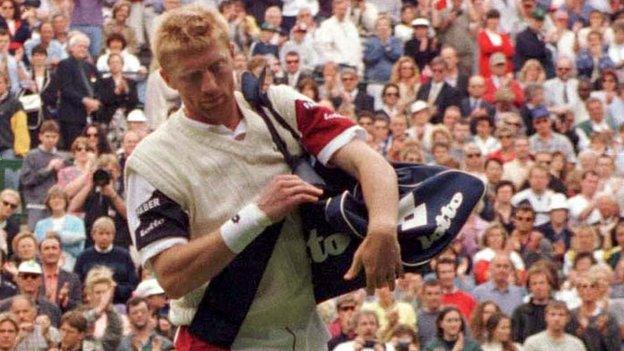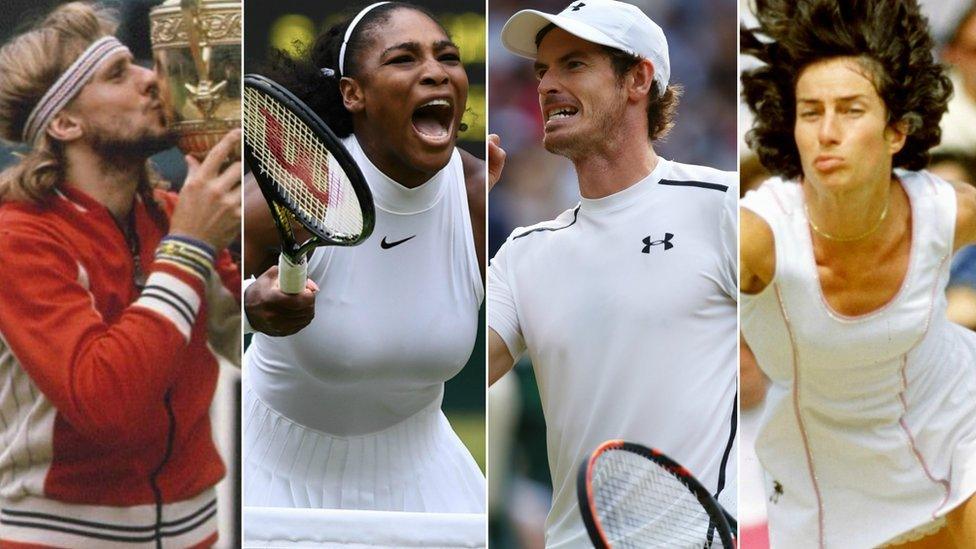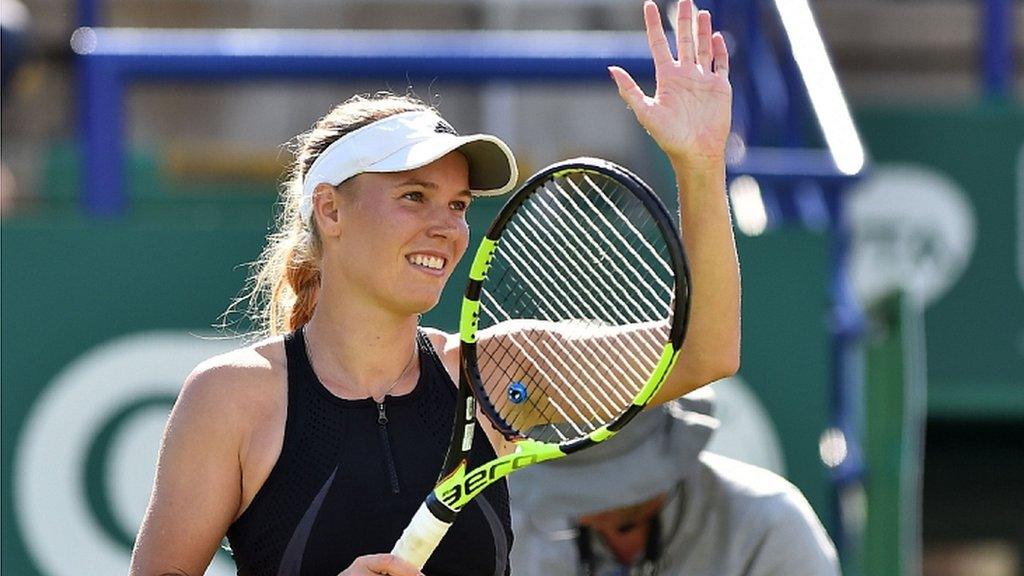Wimbledon 2017: 'You only have one body' - Boris Becker's advice to Andy Murray
- Published
- comments
Murray's shock exit to Querrey - highlights
Wimbledon 2017 on the BBC |
|---|
Venue: All England Club Dates: 3-16 July Starts: 11:30 BST |
Live: Coverage across BBC TV, BBC Radio and BBC Sport website with further coverage on Red Button, Connected TVs and app. Click for full times. |
Andy Murray's defence of his Wimbledon title ended with him limping to defeat in his quarter-final against Sam Querrey on Wednesday.
The 30-year-old Briton will retain his world number one ranking for now, because Novak Djokovic was forced to retire from his match against Tomas Berdych later on the same day.
But what should Murray and his injured hip do next?
Three-time Wimbledon champion Boris Becker explains how top tennis stars cope with advancing age and chronic injury - and why we should not give up hope of seeing the Scot manage a third triumph on Centre Court.
'Age is only a number, but you only have one body'
Archive: Andy Murray limps out of Wimbledon
The next Grand Slam is the US Open, from 28 August. Murray, the 2012 champion, lost in the quarter-finals in New York last year. Before then, he is scheduled to play at ATP tournaments in Montreal from 7 August and Cincinnati a week later.
Becker: Andy Murray's defeat should not be seen as the beginning of the end of his chances of winning another Grand Slam. Absolutely not.
I think what has happened so far this year has actually proved that, the older you get, the better you are - look at Roger Federer and Rafa Nadal, what Serena Williams was doing and what Venus is doing now. They are all older than him.
Age is only a number, but you only have one body. Andy has to look after his.
Murray may rest before US Open
He has got to think long-term, not worry about making the US Open - if he is moving there like he did at Wimbledon, then he won't win it anyway.
So, the worst thing that can happen if he skips New York is that he misses one Grand Slam - that doesn't matter, because the Australian Open is around the corner at the start of 2018.
His ranking should not be a concern either. Again, he will not defend it if he is not healthy, so he should just forget it.
He has been there and done it and he does not have to prove anything anymore that he is good enough to be number one.
'Lessons to be learned from Rafa and Roger'
Federer reaches record 12th Wimbledon semi-final
Rafael Nadal pulled out of the French Open in May 2016 with a wrist injury and did not play again until the Rio Olympics in August. He won his 10th title at Roland Garros earlier this year. Roger Federer missed the final five months of 2016 to recover from his knee injury but returned to win the Australian Open in January.
Becker: With this injury, there are limitations to Andy's movement. There are some players who depend more on their serve who can get quick points, but Andy relies on his speed and footwork, which are an integral part of his game.
That is why he needs to be 100% fit. It's no good for him to be 75% - yes, he is maybe good enough to get to the quarters, like he did here, but he is the number one in the world and he enters tournaments to win them.
The Tour is a gruelling schedule and I would give the same advice to Novak too - rest.
They should both look at the examples of Rafa and Roger. Look at what they have done since coming back fully fit.
Nadal struggled last year with injuries, so he took some time off to get fully fit and look what a year he is having.
So maybe that is a lesson learned for Andy and Novak to really take care of their bodies - take their time and get healthy, and don't play when they can't.
'Andy has to be honest with himself'
Djokovic retires because of injury
Murray admits he has managed his hip condition since he was 22. He has also suffered from chronic back pain that affected him earlier in his career, and he had surgery on an injured disc in 2013. Djokovic revealed after his Wimbledon exit that his elbow has been bothering him for more than 18 months.
Becker: Injuries are part of tennis. Most players have niggles and pains right through the year and usually you are able to manage them with the physios and recovery schedules you are given.
But in Grand Slams you play longer matches and there is more chance they can flare up.
I understand why Andy played Wimbledon, because it is his number one tournament every year, and he was also the defending champion. He was desperate to make it work.
I was always the same. In hindsight, I should not have played some of my matches but, in the heat of the moment, I always wanted to play the next round or the next event.
But you run the risk of doing yourself more serious damage if you play on, and that happened to me. I had my struggles with certain injuries, especially with my right ankle, and I am paying a heavy price today.
Henman analyses Murray's defeat
Andy is now at the point where he needs to be really honest with himself because if he can't run, he can't play.
It looked bad for him on Wednesday but he probably does not know yet what is going to happen next.
I credit him for not wanting to use the hip injury as an excuse for his defeat but he needs to get a couple of opinions from doctors before he thinks about coming back.
'Your motivation changes with age'
Becker won Wimbledon twice as a teenager in 1985 and 1986. His last Grand Slam victory was the 1996 Australian Open at the age of 28. He retired at the age of 32 in 1999.
Becker: Turning 30 is a milestone for a tennis player but it is not a reason to be injured more. That is down to the amount of tennis you play, and how you deal with your injuries.

Boris Becker, the second seed, retired from the 1996 Championships with a wrist injury during his third-round match against Neville Godwin
The attractions for me when I was unable to play were always the same - every week brought another tournament and more ranking points, and of course you want to get back to doing something you love.
I am sure Andy is the same - that desire to keep playing tennis is not his problem, but I think emotions are the wrong things for him to follow right now. He has to follow logic and just think about the rest of his career.
As you get older it does get harder to come back. If it is a new injury every year then it is manageable. If it is the same injury for a number of years, then eventually it can affect your mind-set - and that is the crucial thing here.
Wimbledon 2017: Murray's misery, Federer's fan club & wounded Djokovic
In my experience, your motivation changes with age. It cannot be the same at 30 as it was at 20, and you cannot have the same motivation to win Wimbledon again when you have already won it once, because the second time is not the same.
You have to find different ways to stimulate yourself, because ultimately that is what prolongs your career and means you keep coming back.
Look at Roger Federer, who is playing the best tennis ever at the age of 35 because he has got everything right in the rest of his life too.
'Federer fighting against history'
One of Federer's best?
The four players left in the men's singles have won a total of 19 Grand Slam titles between them. Seven-time Wimbledon champion Federer has won 18 of them - Marin Cilic, who won the 2014 US Open, is the only other major winner left in the tournament.
Becker: Roger will never admit it but he is the clear-cut favourite now.
But, having said that, the Wimbledon semi-final is never easy because your opponent has won five times to get there and is full of confidence.
Tomas Berdych will have nothing to lose when he plays him, and for Roger things are different this year.
No man has won eight Wimbledon titles and I think history is as much of an opponent for him as any of the players left in the tournament.
Wimbledon 2017: Marin Cilic beats Gilles Muller
In the other semi-final, I would give the edge to Cilic over Sam Querrey, because he has won a Grand Slam before and it just feels like his number has come up this year.
Cilic had gone out in the quarter-finals here in the past three years, so he has been knocking on the door for a while, and he has eventually gone through.
Alerts, Live Guide & MySport |
|---|
My Sport: Sign up to follow all the tennis news |
- Published30 June 2017

- Published24 June 2018
